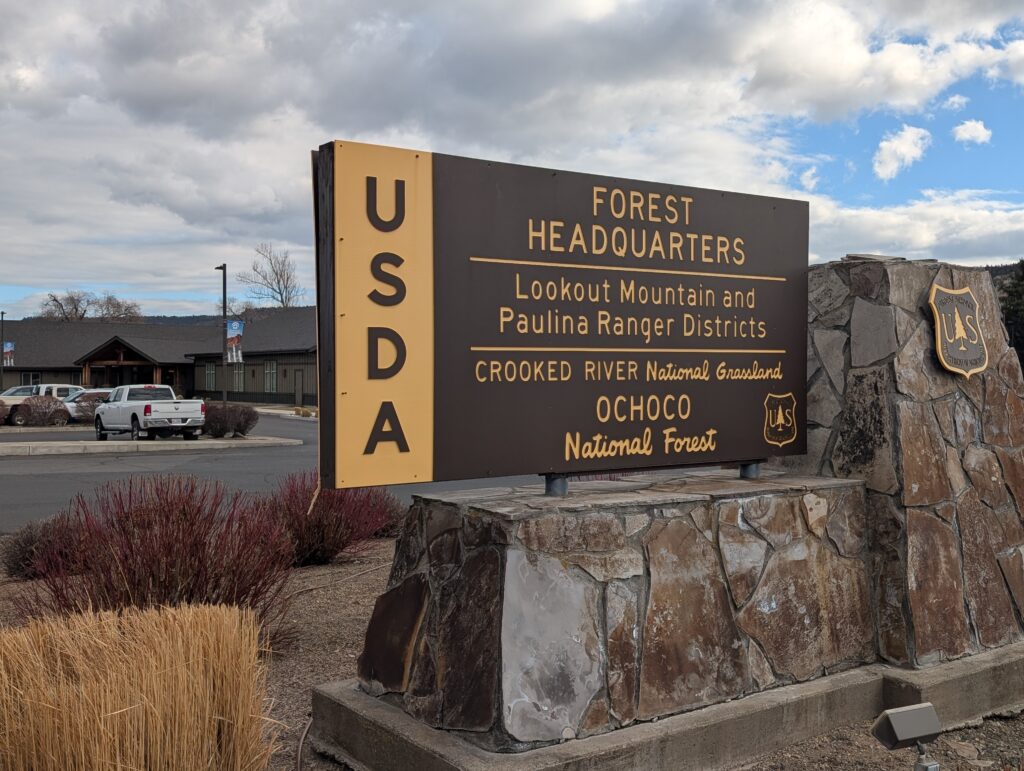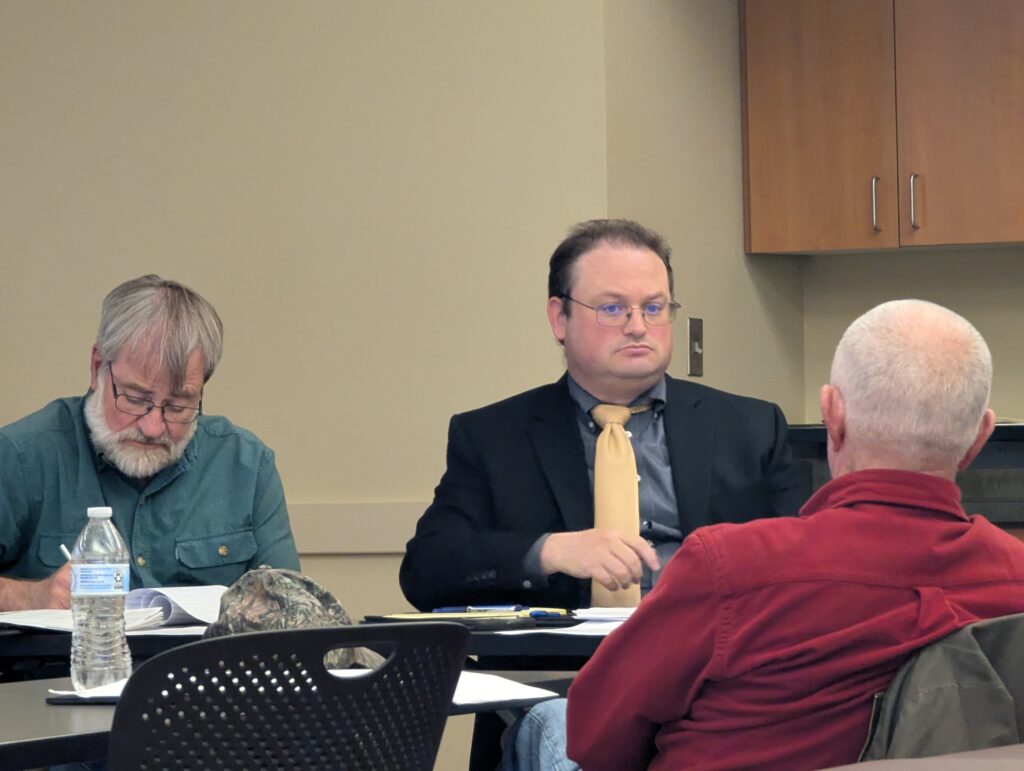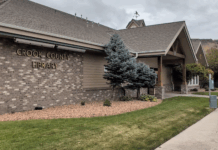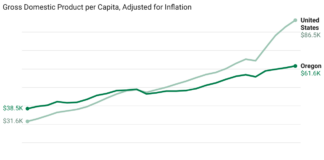
Prineville, Ore. – Following a multi-month and ongoing investigation by the Prineville Review, an appointed member of the Crook County Natural Resource Advisory Committee (NRAC) is facing questions related to Oregon ethics laws after his private contracts with the U.S. Forest Service were revealed — all while the NRAC and the official were holding both public and secret meetings with officials from the USFS regarding potential private land purchases in the Ochoco Mountains by the federal government.
The meeting minutes for the committee do not contain any disclosures of potential conflicts of interest being made by the official.
During a Nov. 13th NRAC meeting, the Prineville Review uncovered that the NRAC had formed a subcommittee to meet with USFS officials over public concerns and the federal government’s potential purchase of a large swath of private property. It also learned that an earlier Oct. 16th meeting had happened, despite never being publically noticed.
The NRAC has repeatedly held discussions regarding the issues outside of the subcommittee, including during its Nov. 13th meeting. Those meetings also included USFS officials.
Cliff Kiser, a commissioner-appointed NRAC member who was also a member of the recently formed subcommittee, is also the owner of Kiser & Kiser, LLC, a business that has maintained active business contracts with the USFS for over a decade. Kiser & Kiser had contracts totaling $125,163 in FY 2024 alone, according to records made available through the Federal Funding Accountability and Transparency Act (FFATA).
In FY 2023, the company received $179,149 from the USFS. In 8 of the last 12 years prior (since 2010), Kiser & Kiser had been awarded $639,933, just over twice the amount of the contracts during the last two years alone which totaled $304,312, a noticeable increase in the 2023-2024 fiscal years from years prior.
Despite the $300k+ contracts from the USFS alone in the last two years (we have no details as to other government or private contracts held by Kiser’s business), Kiser also works as the paid Manager of the Crook County Vector Control District (CCVCD), a position he has held for at least two decades, according to public records. CCVCD is a special district with taxing authority that is a separate public body from the Crook County government.
Following the Nov. 13th meeting, the Prineville Review submitted a public meetings grievance to require the NRAC to provide a formal response to its failure to notice the meeting to the public, and as part of an effort to get more details surrounding the meeting itself. The NRAC was also required to copy its response to the Oregon Government Ethics Commission (or OGEC), the state agency that oversees Oregon’s ethics and public meetings laws.
The grievance was filed only one day before the statutory 30-day deadline to submit the grievance expired.
The NRAC, working under the advice of Crook County’s General Counsel Eric Blaine, admitted to the violation of not noticing the meeting to the public while denying the claim the meeting was not “public”. Officials also claimed that members of the public did attend, but that also raised questions on how those individuals were informed when the County admitted to not noticing its Oct. 16th meeting.
During the NRAC’s special meeting in November to address this publication’s public meetings grievance, Blaine also stated on camera that he agreed with the stance of NRAC’s Board Chair Steve McGuire who had stated he would effectively be blacklisting this reporter and the Prineville Review for raising transparency concerns over the NRAC’s meetings violations through the State’s new public meetings grievance process, suggesting committee members respond with “no comment” if asked any questions.
Crook County’s Natural Resources Manager, Tim Deboodt, has also declined to answer questions from this publication on multiple occasions. Deboodt was hired for the position in 2018. The latest issues are not the first time the County department and advisory committee have been faced with controversy involving its efforts in coordinating the management of public lands in Crook County.
Blaine also repeatedly stated during the NRAC’s meeting that part of the State’s public meetings law (specifically related to the requirement to record the votes taken by committee members) was for Oregonians who were “blithering idiots”. When we asked Blaine shortly after a Board of Commissioners meeting if he wanted to clarify his earlier statements, Blaine declined to comment.
Minutes subsequently provided to the public of the unnoticed Oct. 16th meeting only report the attendance by members of the NRAC as well as USFS officials. This seemingly departs from a claim made in the NRAC’s Dec. 3rd response to the public meetings grievance.
“A meeting, held Oct 16 by the subcommittee of the NRAC, examining natural resource issues connected to an area in Crook County called “Big Summit Prairie” was open to the public, and in fact, one or more members of the public actually attended,” the letter signed by Board Chair Steve McGuire stated.
If so, the statement has only raised more questions on how those alleged “members of the public” were able to attend if no public notice was made as the NRAC admitted in response, or more specifically how those selective members were informed of the meeting while the public at large was kept in the dark.
Blaine’s response on behalf of the NRAC to the public meetings grievance also implied that the NRAC made a single mistake related to that subcommittee’s Oct. 16th meeting. However, a review of the NRAC’s meeting minutes throughout 2023 and 2024 indicates that numerous other meetings of multiple subcommittees failed to provide any notice or even record of minutes as required by the law.
In response to inquiries regarding the statements by Blaine and McGuire and whether they reflected the views of Crook County, Van Vactor said he could not comment on the specific statements but said that the County needed to be committed to transparency and public accountability.
Similar inquiries on the statements were made with each of the county commissioners. While Hermreck and Barney have not responded to this latest and some of our previous inquiries on other topics, Crawford responded shortly following the publication and confirmed he was not aware Mr. Kiser had contracts with the USFS, also expanding.
“Part of being on boards and committees is sharing conflicts when they come up. I can not speak to Mr. Kiser’s knowledge of these rules or if there was or is a conflict,” said Crawford. “I believe that being transparent in government is extremely important. The public’s ability to access information is a necessary part of government.”
Crawford went on to explain his feelings regarding the public statements made by Blaine and McGuire in response to the public meetings grievance involving the NRAC.
“I watched the video of the meeting and what it looked like to me was that [McGuire] was unhappy about the process. From all of my research the grievance was filed correctly and I wish that [Blaine] would have better explained that when Steve brought up his concerns. I think that if [McGuire] had a better understanding of what the process was there would have been a different outcome come,” explained Crawford.
“I find it best to take emotion out of the conversation when it comes to laws and rules. There are requirements and processes that need to be followed.”
Following the discovery and submitting of a public meetings grievance, the Prineville Review began making records requests with the County, much of which it has yet to produce due to its efforts to deny fee waiver requests from this publication, a decision ultimately left to the Crook County Board of Commissions.
The commissioners also decided 2-1 last month to not only grant the fee waiver on our records request (mostly related to email communications between officials) but to deny any reasonable reduction of fees on several of our requests, demanding full payment from the Prineville Review for a fairly straightforward request for records related to the NRAC.
A recent investigation by InvestigateWest featured in the Oregon Capital Chronicle detailed the increasing issues being faced by investigative journalists in the Pacific Northwest in obtaining public records, which in Oregon was primarily due to excessive fees and unnecessary delays by officials.
“The results varied dramatically, but highlighted the seriousness of two major barriers: In Washington’s largest cities, the delays for some types of records could stretch out months, while the records fees in Oregon and Idaho could run into the hundreds — or even thousands — of dollars,” the article summarized.
This publication also stated to the commissioners and county officials that the exorbitant fees for even fairly routine requests, especially for such routine requests without even being provided fair and reasonable fee reduction, would prohibit our ability to report on matters of government transparency within Crook County.
Blaine also appeared to argue that since the County waives requests that it deems are “de minimus”, meaning they are very simple and easy to produce (typically under 30 minutes of staff time), it does not need to give as much consideration to a fee waiver or reduction with moderate or larger requests.
This publication has further questioned County officials and IT staff over claims it could not even produce “meta-data” from emails, a very commonplace practice throughout Oregon when conducting public records requests, especially those submitted by journalists seeking to reveal the conduct of government operations. Meta-data, which would provide a basic log of email transactions like to/from addresses, subject lines, date/time info, and unique identifiers, which do not include the body content of emails, greatly reduces costs and often facilitates reducing fees further by limiting the scope of a request to relevant data.
We also requested this data after Blaine suggested during the meeting that we could curtail our initial request, a request that was already specific and was made with defined keyword searches instead of just generally asking for related emails and requiring staff to sort through thousands of emails.
The County had also initially claimed there were over 5,000 responsive emails, but after an initial challenge by the Prineville Review, admitted there were only approximately 2,100 responsive emails. Additional efforts to clarify if those responsive emails were individual emails or email chains, as well as potential duplicates between accounts, did not yield any additional confirmation by officials.
Our investigation also revealed that Crook County has an ongoing practice of charging nearly twice what the actual costs of its staff, including legal counsel, actually cost the County, raising questions under Oregon’s public records laws which only allow public bodies to recoup its actual costs. Those actual costs would also be before considering fee waivers or reasonable reductions, including with members of the news media who generally have a stronger argument under the State’s public interest and benefits tests related to public record fee waivers.
During meetings of the Board of Commissioners in recent months, commissioners Barney and Hermreck have repeatedly taken the position that the county should not make it a practice to provide fee waivers, creating a de facto policy that this publication is challenging as unreasonable and in violation of the law.
Hermreck went on to argue that if the county began providing fee waivers on records requests citizens would “starve” due to the costs to the county, and strongly argued against any fee waivers. The county was only able to show a few examples of providing fee reductions and waivers in the last half-decade.
She also seemingly expressed frustration that the Prineville Review has not only been uncovering rampant issues across public bodies in Crook County related to public meetings compliance, including with the Board of Commissioners itself but that other investigations by this publication into other committees advising the Board of Commissioners would impact “volunteers”.
“Is this going to be continuing? Is it $800 this week? And then he [this reporter] moves on to another committee and then its another $800, or $1000 dollars? And the other thing I’m concerned about is what happens to our volunteer base because these committees are volunteers,” stated Hermreck.
Hermreck went on to cite additional reasons for denying the fee waiver over concern that our investigative reporting on public meeting violations would ultimately have an impact on finding people to serve on the public bodies within the county. “You don’t go home and read a book about public meeting law, and if you do you have no life — I’m sorry, you have no life.”
“You do this as a good faith effort because you care about this community — so you serve on the fair board, and you serve on natural resources, or you serve on the cemetery district, or you serve on these things — because you care about Crook County. So in my way of thinking is what happens when we get to where we have no volunteers for our boards,” Hermreck remarked.
The three public bodies mentioned by Hermreck have all been subject to recent stories by the Prineville Review for a range of public meeting violations. Hermreck was then subsequently appointed to also fill a vacancy until the next election for a seat on the Crook County Cemetery District Board (an Oregon Special District that is separate from county governments and the other two committees she mentioned).
The current board chair of the cemetery district, Jamie Wood, as well as former director Velda Jones, are currently facing a preliminary investigation by the Oregon Government Ethics Commission. Questions have also been raised about ongoing violations by the cemetery district related to its process to appoint Hermreck, namely on how it had appointed Hermreck without a public discussion before its decision last month.
We attempted to ask Hermreck after the meeting if she also believed that appointed public officials should not be expected to understand even the most basic requirements of the public meetings laws, including providing public notice, but she declined to elaborate.
Commissioner Seth Crawford had repeatedly signaled his concerns over the county’s current procedures and ensuring public transparency, making clear he was in favor of at least granting a reduction in the fees. Crawford also expressed his concern that the county had already and would continue to spend more taxpayer money fighting the news media generally, especially when it involved seeking records to provide information to the public.
“Because the way I see it, I’d like to be as transparent as possible. I understand it’s difficult because it takes people time and these things, but to be the best option is to just get the information out as quickly as possible,” Crawford remarked during the meeting.
“I think there is very good cause here for the commissioners — in this case — to consider a full waiver [of fees],” this reporter said during a Dec. 18th Board of Commissioners meeting.
“I understand that there are questions- we don’t have the answers to either- but I think the public wants them, and they are entitled to them regardless of the facts and what those emails and communications may provide. I would hope that the commissioners here are committed to that transparency to the public and would be willing to recognize here that there is plenty of good reason, considering the county has admitted to the fact this meeting was held illegally.”
The Prineville Review also argued that if the situation related to our current request was not considered a reasonable public benefit and interest for a fee waiver or reduction, including when Crook County officials have admitted to violations under Oregon’s public transparency laws, then what would?
According to the Oregon DOJ, “Waiving or reducing fees is in the public interest ‘when the furnishing of the record has utility—indeed, its greatest utility—to the community or society as a whole.’ This is distinct from situations where disclosure would primarily affect ‘a concern or interest of a private individual or entity.'”
“If a requester seeks records relating to the requester, a mere allegation that the public body has treated the individual oppressively, absent a broader public interest, does not satisfy the public interest standard. On the other hand, investigative reporters with established credentials, who sought records concerning military aviation safety with the intent of reporting on those records, were able
to satisfy the public interest standard by demonstrating that fee requirements inhibited their ability to obtain government records. And a requester who intended to use records in connection with lectures and articles on the history of the labor movement, without personal financial benefit, demonstrated sufficient public interest.”
County Counsel Eric Blaine had also advised the Crook County Commissioners that they have a complete description of whether to provide a fee waiver or reduction, but did not provide any insight related to legal precedence and interpretation provided by the Attorney General’s Office.

“Even if waiving or reducing the fee is in the public interest, a public body has the discretion whether to do so. However, the public body’s decision, on a case-by-case basis, must be reasonable under the totality of the circumstances,” the Oregon DOJ’s opinion goes on to state.
Blaine did however go on to then confirm in response to a question from Commissioner Crawford that the decision related to fee waiver or reductions needed to be “reasonable” on an individual case-by-case basis.
The Prineville Review has advised Crook County Manager Will Van Vactor that it is now preparing to either submit an appeal petition with the Crook County District Attorney or request a facilitated dispute resolution through the Oregon Public Records Advocate.
Van Vactor told us early this month that he was making efforts to further inquire into the situation, but reaffirmed that current county procedures leave the issues of fee waivers with the commissioners.
On Jan. 18th, Van Vactor said he had not yet received a response to his own inquiry into the matter from County staff. “I haven’t heard back yet in response to the inquiry I made, but will move it along,” wrote Van Vactor.
We have not received any further updates from the County since.
The County’s roadblocks since November to our routine records requests prompted additional investigative efforts, including seeking records through federal Freedom of Information Act (FOIA) requests with the USFS. That’s when we also uncovered data made available through the Federal Funding Accountability and Transparency Act (FFATA) which revealed Kiser’s business contracts with the USFS.
USFS officials have also refused to describe the nature of the federal government’s business with Kiser & Kiser amid our inquiries. We have since submitted additional FOIA requests related to the federal agency’s business with Kiser & Kiser.
Data from Highergov.com appeared to indicate that Kiser’s business provided: “Chemical operator/applicator licenses, Heavy equipment available, Tree thinning Wildland fire support”. The business’s primary NAICS code indicates it provides “Support Activities for Forestry”.
The discovery raised several questions due to Oregon’s Ethics Laws under Chapter 244. According to the Oregon Government Ethics Commission, ORS 244.040 prohibits public officials from conflicts of interest that provide an actual or even a potential financial benefit or detriment to the official, their relatives, or household members.
According to the OGEC, “The public body served by the public official is required to record the disclosure of the nature of the conflict of interest in the public body’s official records (e.g. personnel file, meeting minutes, audio/video recording). It is to the public official’s benefit to ensure their conflict disclosure is recorded in their public body’s records.”
“Each time a public official is met with a conflict of interest, the nature of the conflict must be disclosed,” the OGEC says in its official ethics guide.
There had been no indication in any meeting minutes since 2023 where Kiser declared any potential conflicts of interest, including those related to the NRAC’s discussions and collaboration with USFS officials reviewing the potential private property purchase. Additional land under the control and management of the USFS would undoubtedly have the potential to affect private businesses that do business with the federal agency.
Highergov.com also contained information possibly indicating the business was involved in “mosquito control”, raising additional questions due to Kiser’s role as the manager of the CCVCD.
The CCVCD has also yet to provide any formal response to acknowledge our public records request submitted with that special district back in mid-October. An appeal petition for the de facto denial (due to ignoring our records request) filed with District Attorney Kari Hathron, was ultimately denied when Kiser was able to respond to that petition and claim he was “on leave” for approximately three months until early January which provided the district did not have to provide any response or production of records due to the reduced staffing.
Despite that statement, Kiser attended a public meeting of the CCVCD Board in December that was promptly canceled after the Prineville Review asked why the meeting did not allow for remote attendance. The meeting was then held again on Jan 13th, but CCVCD officials would not admit Prineville Review Reporter Zack Calvo into the Zoom meeting.
Calvo also sent messages to Kiser’s mobile phone listed in the meeting notice about not being admitted into the meeting shortly after it was scheduled to start but received no response.
Hathorn ultimately denied our records appeal petition, although it now permits us to seek review in Crook County Circuit Court.
During the NRAC’s recent January meeting, Kiser was not in attendance. According to Board Chair Steve McGuire, Kiser’s application for his reappointment (as his term expired Dec. 31st, 2024), was awaiting confirmation of a “reference”. However, a source within the county, who spoke on the condition of anonymity, claimed that Kiser had actually rescinded his application to be reappointed by Crook County commissioners after the Prineville Review had made inquiries into his business dealings and lack of conflict of interest disclosures.
Shortly before publication, the Crook County Board of Commissioners agenda and notice released for its upcoming Jan 29th meeting listed that it would be considering a reappointment to the NRAC, but more specific information was not provided to confirm if it involved Kiser or another appointee.
Kiser did not respond to requests seeking comment.
This is a developing story that you can count on us to keep you updated.
Note: This story was updated shortly after publication to include additional statements from Crook County Commissioner Seth Crawford in response to our recent request for comment.
Mr. Alderman is an investigative journalist specializing in government transparency, non-profit accountability, consumer protection, and is a subject matter expert on Oregon’s public records and meetings laws. As a former U.S. Army Military Police Officer, he brings a disciplined investigative approach to his reporting that has frequently exposed ethics violations, financial mismanagement, and transparency failures by public officials and agencies.





